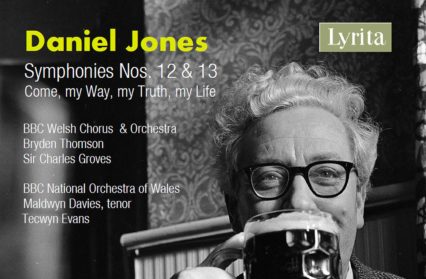David Truslove reviews Daniel Jones‘ Symphonies Nos. 12 & 13, the last piece in an important symphonic project.
This much-anticipated disc is the final instalment of Lyrita’s symphonic traversal of Welsh composer Daniel Jones. Comprising studio and concert broadcast transfers across a thirty-year period, this CD constitutes a significant completion for a composer whose works are still relatively unknown outside Wales. Even within the principality the reception of his music during his lifetime (1912-1993) was often more respectful than enthusiastic, and an obituary in The Times observed that Jones never achieved the status of Alun Hoddinott or William Mathias claiming “his music didn’t export as well as theirs”. If that suggests a certain insularity, Jones’ music is anything but parochial, yet traditionalists believed his music was too progressive, while modernists considered him too conventional. Lyrita’s splendid issue provides an opportunity for your own evaluation of the composer’s final symphonies.
Conceived between 1947 and 1992, Jones’ thirteen works in the medium form the cornerstone of his oeuvre; each of the first twelve symphonies is based on a different note of the chromatic scale. The last is the (usually) unnumbered 1992 Symphony in memoriam John Fussell, while the First, following its public premiere in Swansea in 1949, was a watershed in Welsh music. If a new name had found its way into the programmes of British symphonic music, Grace Williams had pipped Daniel Jones to the post by writing the first Welsh symphony when it appeared in 1943. Like Williams, Jones was very much a European composer and while her lyrical leanings pervade much of her work, Jones has often been associated with a more craggy, uncompromising manner.
Symphony No. 12 has been remastered from a 1990 studio broadcast with Bryden Thomson conducting the then BBC Welsh Symphony Orchestra. It is a strikingly concise work from 1985. Jones modelled its length on the symphonies of Haydn, claiming ‘most music seems too long these days. One should say what one has to say, then shut up’. Lasting under seventeen minutes, the Twelfth is scored for substantial forces, used resourcefully and always with an acute ear for balance and colour. A terseness of expression characterises the first movement, but while it variously broods, confides and searches, I don’t hear any compelling gravitational pull or sense of accumulating momentum. The ‘Giocoso’ second movement feels glib, and the ‘Serioso’ third (bookended by muted trumpets) builds to an impressive climax yet never quite regains a sense of direction. The ‘Risoluto’ fourth is highly charged, although any sense of finality suggested by the work’s superscription ‘Yet one last tale, And my chronicle is ended’ never materialises.
Farewell to a cherished form? Clearly not, since Jones’ final symphonic statement occurred the year before his death with his Symphony in memory of John Fussell (No. 13), a personal tribute to a friend, Director of the Swansea International Festival and the city’s organist for twenty years. This recording is drawn from a 2017 BBC Concert broadcast given by BBC NOW and directed by the New Zealander Tecwyn Evans. The first movement (‘Solenne’) is appropriately grave and unfolds in a satisfying arch, its gritty lyricism set in motion by an ear-catching combination of solo trombone, marimba, horns, timpani, and low strings, all reappearing for the epilogue. By contrast, the ensuing ‘Capriccioso’ abounds in a puckish vitality, offset by the somewhat angular ‘Lento’ movement, initiated by terse woodwind solos and incorporating a solemn processional. Angularities continue in the trenchant gestures that launch the finale which soften in a tranquillo quotation from an earlier organ piece first given out by via muted strings and then by an organ for an arresting entry that leads to the work’s life-affirming close.
Overall, I find Symphony No. 13 a more gratifying work than its predecessor. Not least, is a more satisfying sound quality – clearer than the rather cloudy transfer of Jones’ cantata Come, my Way, my Truth, my Life (words by George Herbert) which completes the disc. The recording is taken from the 1987 premiere at the Swansea Festival and despite best endeavours from tenor soloist Maldwyn Davies (wonderfully declamatory), conductor Sir Charles Groves (superbly assured) and the BBC Welsh Chorus and Orchestra, this performance is not heard to best advantage. Apart from poor diction and some insipid soprano sound at the beginning of ‘The Call’, the chorus put in a creditable, if not entirely convincing account of a work that reveals a pleasing lyricism and powerful dramatic sense. But the episodic character of much of the writing, no matter how well-crafted in other ways and illuminated by Groves, does not bring the same dividends as his earlier cantata The Country Beyond the Stars. If Come, my Way, my Truth, my Life prompts more respect than love, it’s partly due to a familiarity with Vaughan Williams own setting of two of the texts from the Five Mystical Songs. Of these, the pageantry of Jones’ closing ‘Antiphon’ (‘Let all the world in every corner sing’) just misses the mark, sounding effortful, Jones not entirely in his comfort zone.
Reservations aside, we should raise a glass to Lyrita (just as the composer seems to do on the disc’s cover) for the final hurrah of an important symphonic project. Once again, Lyrita have performed an invaluable service to 20th century British music. Full texts are included with Paul Conway’s excellent liner notes.
Symphony No. 12 (1985), BBC Welsh Symphony Orchestra/Bryden Thomson/ BBC Studio Recording, 1990
Symphony in memory of John Fussell (No. 13), (1992), BBC National Orchestra of Wales/Tecwyn Evans/ BBC Concert Broadcast, 2017
Come, my Way, my Truth, my Life (1987), Maldwyn Davies/Sir Charles Groves/BBC Welsh Chorus and Orchestra/ BBC Broadcast – Swansea Festival, 1987
Daniel Jones: Symphonies Nos. 12, 13 & Come, my Way, my Truth, my Life is available now.











